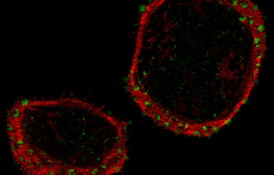Home > Press > Stem cells are a soft touch for nano-engineered biomaterials
 |
| This photo shows cells adhering to large nanopatterns. The green dots indicate the sites of adhesions, and the red area shows where molecules responsible for contracting the cells are located. |
Abstract:
Scientists from Queen Mary University of London have shown that stem cell behaviour can be modified by manipulating the nanoscale properties of the material they are grown on - improving the potential of regenerative medicine and tissue engineering as a result.
Stem cells are a soft touch for nano-engineered biomaterials
London, UK | Posted on June 9th, 2014Stem cells are special because they are essential to the normal function of our organs and tissues. Previous research shows stem cells grown on hard substrates go on to multiply but do not differentiate: a process by which the cells specialise to perform specific functions in the body. In contrast, stem cells grown on softer surfaces do go on to differentiate.
In this new study, published in the journal Nano Letters, the researchers used tiny material patches known as nanopatches to alter the surface of the substrate and mimic the properties of a softer material.
"By changing the surface properties like the shape of the substrate at the nanoscale level, we tricked the stem cells to behave differently," explains co-author Dr Julien Gautrot, from QMUL's School of Engineering and Materials Science and the Institute of Bioengineering.
The team tested different sizes of nanopatches - from 3 microns to 100 nanometres (about one thousandth of the diameter of a hair). The stem cells behaved as if they were on a soft surface when in contact with the smallest patches because they can't firmly grip them.
Dr Gautrot added: "This development will be useful when there's a need to create a rigid implant to be inserted into the body. Potentially, such nanopatches could provide a soft touch to the surface of the implant so that cells from the neighbouring tissues are not perturbed by such a hard material."
####
For more information, please click here
Contacts:
Neha Okhandiar
020-788-27927
Copyright © Queen Mary, University of London
If you have a comment, please Contact us.Issuers of news releases, not 7th Wave, Inc. or Nanotechnology Now, are solely responsible for the accuracy of the content.
| Related News Press |
News and information
![]() Researchers develop molecular qubits that communicate at telecom frequencies October 3rd, 2025
Researchers develop molecular qubits that communicate at telecom frequencies October 3rd, 2025
![]() Next-generation quantum communication October 3rd, 2025
Next-generation quantum communication October 3rd, 2025
![]() "Nanoreactor" cage uses visible light for catalytic and ultra-selective cross-cycloadditions October 3rd, 2025
"Nanoreactor" cage uses visible light for catalytic and ultra-selective cross-cycloadditions October 3rd, 2025
Nanomedicine
![]() New molecular technology targets tumors and simultaneously silences two ‘undruggable’ cancer genes August 8th, 2025
New molecular technology targets tumors and simultaneously silences two ‘undruggable’ cancer genes August 8th, 2025
![]() New imaging approach transforms study of bacterial biofilms August 8th, 2025
New imaging approach transforms study of bacterial biofilms August 8th, 2025
![]() Cambridge chemists discover simple way to build bigger molecules – one carbon at a time June 6th, 2025
Cambridge chemists discover simple way to build bigger molecules – one carbon at a time June 6th, 2025
![]() Electrifying results shed light on graphene foam as a potential material for lab grown cartilage June 6th, 2025
Electrifying results shed light on graphene foam as a potential material for lab grown cartilage June 6th, 2025
Discoveries
![]() Researchers develop molecular qubits that communicate at telecom frequencies October 3rd, 2025
Researchers develop molecular qubits that communicate at telecom frequencies October 3rd, 2025
![]() Next-generation quantum communication October 3rd, 2025
Next-generation quantum communication October 3rd, 2025
![]() "Nanoreactor" cage uses visible light for catalytic and ultra-selective cross-cycloadditions October 3rd, 2025
"Nanoreactor" cage uses visible light for catalytic and ultra-selective cross-cycloadditions October 3rd, 2025
Announcements
![]() Rice membrane extracts lithium from brines with greater speed, less waste October 3rd, 2025
Rice membrane extracts lithium from brines with greater speed, less waste October 3rd, 2025
![]() Researchers develop molecular qubits that communicate at telecom frequencies October 3rd, 2025
Researchers develop molecular qubits that communicate at telecom frequencies October 3rd, 2025
![]() Next-generation quantum communication October 3rd, 2025
Next-generation quantum communication October 3rd, 2025
![]() "Nanoreactor" cage uses visible light for catalytic and ultra-selective cross-cycloadditions October 3rd, 2025
"Nanoreactor" cage uses visible light for catalytic and ultra-selective cross-cycloadditions October 3rd, 2025
Interviews/Book Reviews/Essays/Reports/Podcasts/Journals/White papers/Posters
![]() Spinel-type sulfide semiconductors to operate the next-generation LEDs and solar cells For solar-cell absorbers and green-LED source October 3rd, 2025
Spinel-type sulfide semiconductors to operate the next-generation LEDs and solar cells For solar-cell absorbers and green-LED source October 3rd, 2025
![]() Rice membrane extracts lithium from brines with greater speed, less waste October 3rd, 2025
Rice membrane extracts lithium from brines with greater speed, less waste October 3rd, 2025
|
|
||
|
|
||
| The latest news from around the world, FREE | ||
|
|
||
|
|
||
| Premium Products | ||
|
|
||
|
Only the news you want to read!
Learn More |
||
|
|
||
|
Full-service, expert consulting
Learn More |
||
|
|
||








